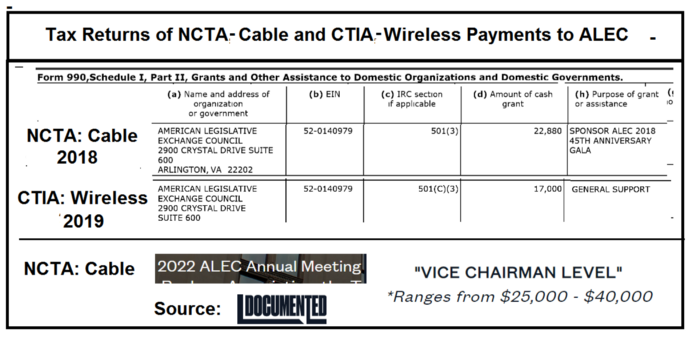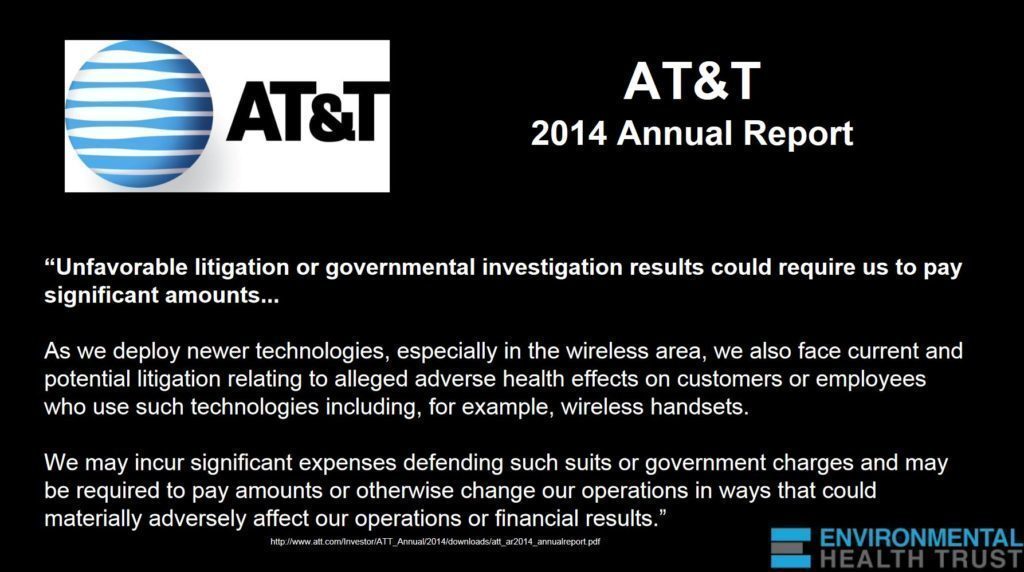 By B.N. Frank
By B.N. Frank
Last month Activist Post reported about AT&T having to pay $23M for bribing a former legislator to vote for and influence others to vote for a bill that ended AT&T’s obligation to provide landline phone service in Illinois. Thanks to telecom expert and “Irregulator” Bruce Kushnick for providing more unsavory details.
From Medium:
Secrets of an AT&T Scandal and the Ties to ALEC.
By David Rosen with Bruce Kushnick
On October 14th, 2022, AT&T Illinois, (also known as Illinois Bell Telephone Company), agreed to pay a $23 million fine to resolve a federal criminal investigation into alleged misconduct involving the company’s efforts to unlawfully influence former Illinois Speaker of the House Michael J. Madigan. (NOTE: AT&T Illinois is a subsidiary of AT&T, Inc.)
Madigan was a very influential political player. The Justice Department notes that, in addition to being Speaker, he had been a congressman representing Illinois’s 22nd District; Committeeman for Chicago’s 13th Ward; Chairman of both the Illinois Democratic Party and the 13th Ward Democratic Organization; and partner at the influential Chicago law firm, Madigan & Getzendanner. It adds, he “used these positions to further the goals of the criminal enterprise.”
The Justice Department states,
“AT&T Illinois admitted that in 2017 it arranged for an ally of Madigan to indirectly receive $22,500 in payments from the company. The company paid the money through an intermediary — a lobbying firm that performed services for AT&T Illinois.” The ally was Michael F. McClain who, the Justice noted, “carried out illegal activities at Madigan’s behest.”
A week later, on October 21st, the former president of AT&T Illinois, Paul La Schiazza, pleaded not guilty to federal charges alleging he orchestrated and approved the scheme to funnel payments to a Madigan associate. A federal grand jury charged La Schiazza with conspiracy, federal program bribery and using a facility in interstate commerce to promote unlawful activity. According to the Chicago Tribune, “the most serious counts carry up to 20 years in prison if convicted.”
Seven months before the AT&T’s Illinois revelations, Madigan was accused in a separate 22-count indictment “of leading for nearly a decade a criminal enterprise whose purpose was to enhance Madigan’s political power and financial well-being while also generating income for his political allies and associates.”
The indictment alleged that between January 27, 2014, and May 3, 2019, the Chicago utility company, Commonwealth Edison (aka ComEd), made payments totaling more than $2 million to Madigan and his close associates. They included McClain and ex-ComEd CEO Anne Pramaggiore as well as ComEd lobbyist John Hooker and consultant Jay Doherty.
The Chicago Sun-Times reports
“Doherty made $256,000 in payments to an unnamed individual identified by the Sun-Times as former Ald. Frank Olivo, $325,000 in payments to a second unnamed individual, and $144,000 in payments to a third.” It added, “ComEd agreed to pay a $200 million fine — believed to be the largest criminal fine ever in Chicago’s federal court.”
Digging deeper, we uncovered the most hidden “secret” of the AT&T Illinois bribery scandal involved a 2017 state legislature vote regarding what is known as “Carrier of Last Resort” (COLR), that “terminated AT&T Illinois’ costly obligation to provide landline telephone services to all Illinois residents.” Still more hidden, the secret involved the American Legislative Exchange Council (ALEC), one of the most important groups influencing telecom policy. It promotes itself as a “nonpartisan individual membership organization of state legislators that favors federalism and conservative public policy solutions.”
ALEC is, formally, a non-profit group that drafts model legislation. It has an estimated membership exceeding 2,400 state legislators from both political parties, but most are conservative Republicans. It regularly invites members to all-expense paid private gatherings with corporate executives and lobbyists where they devise model legislation to fulfill their political agenda, many involving telecommunications policy. These legislators, in turn, return to their home states and promote the legislation at state houses throughout the country. Many of their initiatives are enacted.
With the adoption of the Telecommunications Act of 1996, and a series of actions over the next two+ decades at the FCC, Congress and in the states, telecom providers succeeded in having telecom services and business obligations “deregulated”. such as allowing the broadband/internet and wireless services to be reclassified as what is known as”information services”, or ‘Title I”. They also sought to end the COLR obligation — the principle that a phone service must be available at prevailing rates even to customers who live in rural areas, such as farms. And Big Telecom and ALEC led the campaign to end COLR obligations.
NOTE: Phone service and the networks, including broadband, have always been classified as ‘telecommunications’, under“Title II”, with common carrier obligations — i.e., open networks. An ‘information’ service does not have the same requirements.
John Stephenson, former director of ALEC’s Communications and Technology Task Force, led the campaign against COLR. “Those [old rules] were written at a time when consumers had no choice in the matter,” he said. Going further, he insisted that fewer regulations would lead to more investment in broadband and other services. “If we were to clear the underbrush of these rules written long before the Internet was even a word,” Stephenson argued, “there would be a lot more broadband deployed to the United States, and things that are even better that we can’t conceive of today.”
Public Knowledge’s Harold Feld is concerned about the abolition of COLR protections. “It’s been this sort of, “The Internet is magic and we don’t want to look too closely at it,’” Feld says. “The problem is, it’s not magic … and when you just leave this stuff to its own devices, sometimes it breaks down.”
To date, more than 29 states have adopted COLR legislation, including Illinois. In 2020, the Oregon legislature pointed out, “Meeting the broader policy goal of universal access to broadband would effectively moot the need for a COLR obligation for voice telephony, as broadband service can provide both information and voice services.” It then added: “More than a quarter of Oregonians live in areas that are unserved, underserved, or have older technologies that will not be able to meet the digital demands of the very near future.”
But, as we follow this trail, we find that AT&T’s footprint covers 21 states and 19 of these states had passed almost identical COLR legislation by 2017.
Darker Secrets. The current cases in Illinois have yet to follow the money trail or business practices tied to Illinois AT&T, the AT&T subsidiaries, the COLR legislation, and ALEC.
Unbeknownst to almost all those reading this, all of the AT&T coverage areas in the 21 states are still state-based telecommunications public utilities. Thus, AT&T Illinois, (previously named Illinois Bell Telephone Company), like the electric or gas company, is a utility, and a subsidiary of AT&T, Inc., the holding company in control of these and the other subsidiaries.
And over the last 2 decades, the companies have been able to hide the fact that they are still utilities. Worse, they also claim that the utilities are just the basic old legacy voice-calling service, when, in fact, the fiber optic wires that have been put in were done as supposed upgrades of the utility networks, and thus used the state utility construction budgets, which was then charged mainly to the state utility telephone customers. These upgrades should have been used to serve the unserved areas, but instead have been used to build the other lines of business, such as wireless.
In short, Big Telecom used the ALEC “COLR” legislation as a way to keep the benefits of being a telecommunications utility, like rights of way, but not have obligations, and could use this game to divert the construction budgets to fund the company’s other lines of business. This has made the entire US wired telecommunications networks appear unprofitable, as the subsidiaries are not paying their fair share. It has been used as an excuse to not properly upgrade the states — creating unserved areas, as well as a way to raise rates, save on taxes, cut trained staff, and, at the core, it helped to create the Digital Divide — all in plain sight with virtually no government oversight.
The ALEC-Big Telecom Two Step. AT&T, Verizon and some of the Big Telecom and Cable gang have officially claimed that they left ALEC, but the ties to this group are still there. First, the COLR legislation has been around for decades, when these companies were official ALEC members. But more insidious, AT&T et al. are part of and control a number of industry associations who are still paying members of ALEC, including the CTIA, the wireless association, and the NCTA, the cable association. Moreover, these associations are being used as cash machines that fund the ties to ALEC as well as give donations to other non-profits that also do heavy lifting to back AT&T and Big Telecom’s public policy campaigns.
This next chart shows payments from the CTIA and NCTA’s I.R.S. tax returns. The CTIA paid ALEC $17,000 for ‘general support’ in 2019, and the NCTA was a sponsor of ALEC’s 45th Gala in 2018. The investigative group, Documented, highlighted the ALEC 2022 annual meeting showing the NCTA being a “vice chairman” sponsor at $25,000–$40,000. (Note: ProPublica was the source of the tax returns. Also, the 2020 and 2021 returns were not available.)
To add insult to injury, the NCTA is run by former FCC Chairman Michael Powell, who is now president and CEO and was paid $5.2 million in 2018. Meredith Baker, a former FCC commissioner, is now CTIA president and CEO, and made $6.3 million in salary and perks in 2019. In 2003, the Center for Public Integrity started a 3-year project on broadband, inequality and the well-connected, with a feature on the ‘revolving door’ at the FCC when Powell was FCC chairman. It is clear that 20 years later the situation has not changed; we have an ethical divide as well, and the Office of Government Ethics is the punchline of a not funny, bad joke.
But, America should not worry. According to Ars Technica, AT&T claims this is an isolated incident in Illinois and it won’t happen again.
“AT&T must pay the $23 million fine to the Crime Victims Fund within 30 days. ‘We hold ourselves and our contractors to the highest ethical standards. We are committed to ensuring that this never happens again,’ AT&T said in a statement to media organizations.”
This is our first article to expose this subterranean underworld of Big Telecom and Cables’ violations and egregious acts.
David Rosen and Bruce Kushnick have written two new books; DISS-CONNECTED, and Violations & Egregious Acts, This article was originally written by David Rosen and published by CounterPunch
Activist Post reports regularly about Big Telecom and government corruption. For more information visit our archives and the following websites:
Top image: Pixabay
Become a Patron!
Or support us at SubscribeStar
Donate cryptocurrency HERE
Subscribe to Activist Post for truth, peace, and freedom news. Follow us on SoMee, Telegram, HIVE, Flote, Minds, MeWe, Twitter, Gab, What Really Happened and GETTR.
Provide, Protect and Profit from what’s coming! Get a free issue of Counter Markets today.



Be the first to comment on "Bipartisan Nonprofit Played Role in Telecom Bribery Scandal that Led to Federal Criminal Investigation and $23M Settlement"